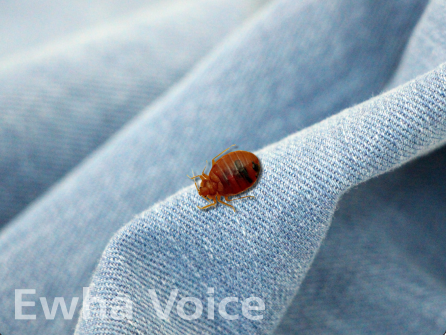
28 cases of bedbugs in Seoul have frightened residents, bringing attention to the outbreak. Universities nationwide became especially worried after the reported cases of bedbugs in Keimyung University, realizing that South Korea is no longer bedbug free.
In preparation for the 2024 Paris Olympics, France has been conducting hygiene checks that revealed massive populations of bedbugs living amongst French citizens. These reports have brought global attention to these harmful pests.
Following the reports of bedbugs in Paris and a spate of local discoveries, South Korea is on alert. The emergence of these unfamiliar pests has had an unsettling effect, and efforts are being made at all levels to eradicate them.
Bedbugs are pests that are mainly active in dark areas, sucking blood at night. People affected often discover bite marks after waking up in the morning. As its name implies, bedbugs inhabit warm and secure environments in homes such as beds, which provides them with a suitable area for both breeding and bloodsucking.
Professor Yang Yeong Chul from Eulji University’s Department of Health and Environmental Safety elaborated on the current outbreak.
“Most reports of bedbugs are viewed as foreign inflows,” Professor Yang said. “It has been confirmed that bedbugs are entering via overseas travelers, spreading in lodging facilities, exam halls, and universities.”
According to Professor Yang, during the 1970s, South Korea was successful in eradicating bedbugs due to housing improvement projects, while European countries were unable to do so, leading bedbugs to survive until now.
Recently, the appearance of bedbugs in school dormitories have been reported by several universities in Seoul.
Commenting on the outbreak, a student from the Department of Pre-Medicine who wishes to remain anonymous was extremely worried to hear that pests that she has never encountered in her life are now often found in public facilities including subways. As a student who transports via subway stations and lives with her family, she hopes the situation improves soon.
Professor Yang noted that local governments’ lack of attention to prevent bedbugs might have been part of the problem.
Responding to this issue, Lee Ah Ra, the supervisor of Seodaemun-gu Public Health Center, reported on how Seodaemun-gu has sought to prevent and control potential bedbug infestations.
“It is a relief that there have been no reported cases of bedbugs in Seodaemun-gu so far,” Lee said. “However, I often receive phone calls from residents expressing their concerns towards the possibility of contact with bedbug in public areas.”
Lee indicated that it is crucial to check the manuals created by the Korea Centers for Disease Control and Prevention (KDCA) as they provide professional explanation about the bedbug outbreak.
In addition to such efforts made by the Korea Centers for Disease Control and Prevention to deal with the bedbug issue, the national government is also putting forth the effort. On Nov. 7, the South Korean government announced a change in the insecticide used to kill bedbugs.
“To this point, we have been using pyrethroid insecticides as our main weapon for eradicating the bugs since it led to paralysis of their muscles,” Professor Yang explained. “But with the bedbugs growing to be immune to such chemical, the government responded by newly approving an insecticide that affects the nicotine acetylcholine receptors, which is expected to deal with those that are resistant to pyrethroid.”
Professor Yang explained that besides the effectiveness of the insecticide, it may trigger secondary damage since the chemical components could generate chronic aftereffects among people who are exposed to it.
Despite the widespread concerns, Professor Yang claimed that simple physical prevention such as shaking your coat before entering your house is sufficient to prevent home infection. This is because bedbugs are vulnerable to vibration and will instinctively seek to escape. Taking this easy step and staying alert with updates will help prevent the further spread of bedbugs in Korea.

